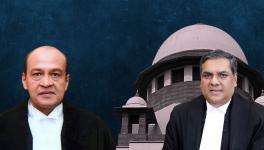Split Verdict by Apex Court in Karnataka Hijab Ban Case
New Delhi: The Supreme Court of India on October 13 gave a split verdict on a batch of petitions challenging the Karnataka High Court's judgement refusing to lift the ban on hijab in state educational institutions.
A bench comprising Justices Hemant Gupta and Sudhanshu Dhulia pronounced the verdict on a batch of appeals filed against the Karnataka High Court’s March 15 judgement which held that hijab was not an essential practice of Islam and allowed the ban on wearing the headscarf in educational institutions in the State.
The bench had reserved judgment in the case on September 22 after a hearing the matter for 10 days. In view of the split verdict, SC directs placing appeals against the Karnataka HC order before the Chief Justice of India (CJI) for the constitution of a larger bench.
While Justice Hemant Gupta dismissed the appeals challenging the Karnataka High Court order, Justice Sudhanshu Dhulia allowed them. Justice Dhulia said that the Karnataka HC has taken the wrong path and that wearing a hijab is ultimately a matter of choice, nothing more or less. He also said that his focus was on the education of girl child, especially in rural areas.
Justice Hemant Gupta, while dismissing the appeals challenging the order which had upheld the state government's order, said the matter is referred to the Chief Justice Of India for appropriate direction.
Chronology of the Case
On March 15, the Karnataka high court dismissed the petitions filed by a section of Muslim students of the Government Pre-University Girls College in Karnataka’s Udupi seeking permission to wear the hijab inside classrooms, ruling it is not a part of the essential religious practice in Islamic faith.
Various petitioners approached the apex court challenging the Karnataka HC order upholding the Karnataka government's order which directs strict enforcement of schools and colleges' uniform rules.
One of the appeals in the top court has alleged "step-motherly behaviour of government authorities which has prevented students from practising their faith and resulted in an unwanted law and order situation."
The appeal said the High Court in its impugned order "had vehemently failed to apply its mind and was unable to understand the gravity of the situation as well as the core aspect of the Essential Religious Practices enshrined under Article 25 of the Constitution of India."
During the arguments in the apex court, a number of counsel appearing for the petitioners had insisted that preventing Muslim girls from wearing the hijab to the classroom will put their education in jeopardy as they might stop attending classes.
Counsel for the petitioners had argued on various aspects, including the state government's February 5, 2022 order which banned wearing clothes that disturb equality, integrity, and public order in schools and colleges.
Some advocates had also argued that the matter be referred to a five-judge constitution bench.
On the other hand, the counsel appearing for the state had argued that the Karnataka government order that kicked up a row over hijab was "religion neutral".
Insisting that the agitation in support of wearing hijab in educational institutions was not a "spontaneous act" by a few individuals, the state's counsel had argued in the apex court that the government would have been "guilty of dereliction of constitutional duty" if it had not acted the way it did.
The state government's order of February 5, 2022, was challenged by some Muslim girls in the high court.
‘The Hijab Row’
The Hijab row erupted in January this year when the Government PU College in Udupi allegedly barred six girls wearing the hijab from entering. Following this, the girls protested outside the college over being denied entry.
Following this boys from several colleges in Udupi started attending classes wearing saffron scarves. This protest spread to other parts of the state as well leading to protests and agitations in several places in Karnataka.
As a result, the Karnataka government said that all students must adhere to the uniform and banned both hijab and saffron scarves till an expert committee decided on the issue.
On February 5, the pre-University education board released a circular stating that the students could only wear the uniform approved by the school administration and that no other religious attire would be allowed in colleges.
(With PTI inputs)
Get the latest reports & analysis with people's perspective on Protests, movements & deep analytical videos, discussions of the current affairs in your Telegram app. Subscribe to NewsClick's Telegram channel & get Real-Time updates on stories, as they get published on our website.
























